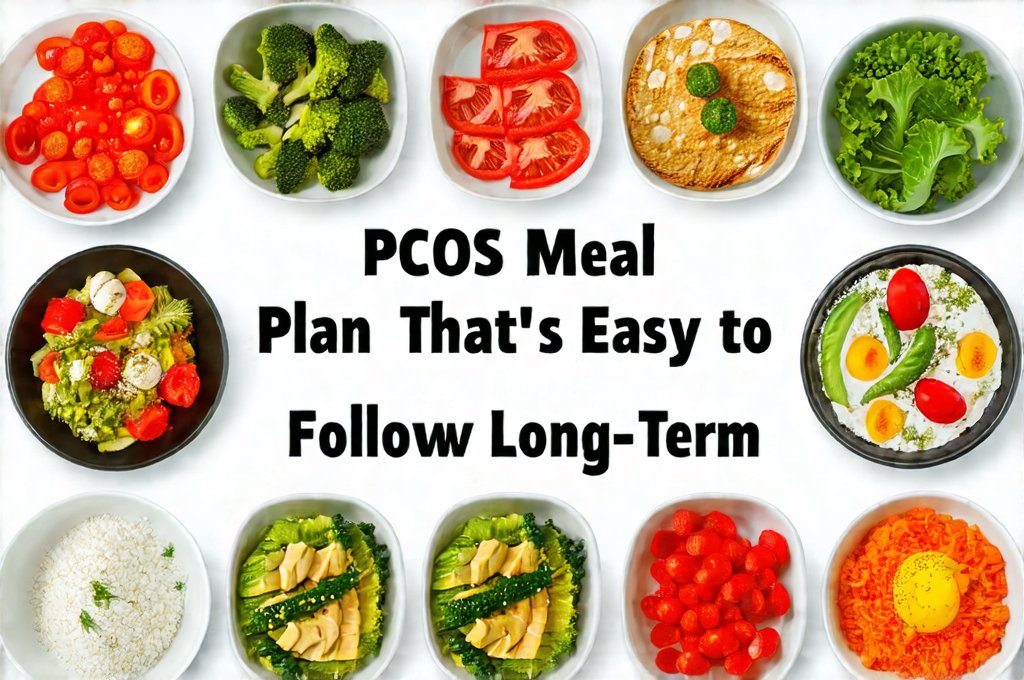Polycystic Ovary Syndrome (PCOS) impacts millions worldwide, often presenting challenges beyond reproductive health. Many individuals experience metabolic disruptions – like insulin resistance – that can contribute to weight gain, difficulty losing weight, and an increased risk of type 2 diabetes and heart disease. This makes dietary management a cornerstone of PCOS care. However, restrictive diets are rarely sustainable long-term and can even exacerbate stress levels, negatively impacting hormonal balance. The key isn’t about deprivation; it’s about building a nourishing eating pattern that supports stable blood sugar, reduces inflammation, and empowers you to feel your best – physically and emotionally.
This article will explore a practical, easy-to-follow meal plan approach for managing PCOS symptoms through food. We won’t focus on quick fixes or fad diets. Instead, we’ll concentrate on creating lasting habits centered around whole foods, balanced macronutrients, and mindful eating. The goal is to provide you with actionable strategies and a framework that can be adapted to your individual needs and preferences – because there isn’t one single “PCOS diet” that works for everyone. This approach prioritizes feeling good, energized, and in control of your health journey.
Understanding the Dietary Goals for PCOS
The central aim of a PCOS-friendly meal plan is to address insulin resistance, which often underlies many symptoms. When cells become resistant to insulin, the body produces more, leading to higher blood sugar levels and potentially hormonal imbalances. Chronic inflammation also plays a significant role in PCOS, so incorporating anti-inflammatory foods is crucial. Therefore, we’re aiming for dietary patterns that stabilize blood glucose, reduce inflammatory responses, and support overall metabolic health. This isn’t about eliminating entire food groups (unless medically necessary); it’s about making informed choices and prioritizing nutrient density.
A successful long-term plan focuses on balance rather than restriction. It emphasizes consuming foods with a low glycemic index (GI) – those that release glucose slowly into the bloodstream – alongside adequate protein, healthy fats, and fiber. Fiber slows down digestion, preventing rapid blood sugar spikes. Protein supports satiety and muscle maintenance, which improves insulin sensitivity. Healthy fats are essential for hormone production and overall well-being. It’s also important to remember the impact of gut health on hormonal balance and inflammation; incorporating probiotic and prebiotic-rich foods can be incredibly beneficial.
Finally, hydration is often overlooked but vitally important. Water supports all bodily functions, including digestion and nutrient absorption, and helps regulate hormone levels. Aim for at least eight glasses of water per day – more if you are active or live in a hot climate. A well-hydrated body simply functions better.
Building Your Plate: Macronutrient Focus
Let’s break down how to construct meals that support PCOS management through macronutrient balance. Think of each meal as an opportunity to nourish your body with the building blocks it needs. The goal isn’t necessarily about counting calories, but rather focusing on quality and proportion. A great starting point is to visualize a plate divided into sections:
- 50% Non-starchy Vegetables: These include leafy greens (spinach, kale), broccoli, cauliflower, peppers, cucumbers, zucchini, and asparagus. They’re low in calories, high in fiber, and packed with vitamins and minerals.
- 25% Lean Protein: Opt for sources like chicken breast, turkey, fish (salmon, tuna), lean beef, eggs, beans, lentils, or tofu. Protein keeps you full and supports muscle mass.
- 25% Healthy Fats & Complex Carbohydrates: Choose whole grains like quinoa, brown rice, or sweet potatoes alongside healthy fats from avocados, nuts, seeds, olive oil, or fatty fish. This combination provides sustained energy and essential nutrients.
This “plate method” is a flexible guide that can be adapted to your preferences. It’s far more sustainable than strict dieting because it allows for variety and doesn’t feel restrictive. Remember, consistent healthy choices are more impactful than occasional perfection.
Sample Meal Ideas & Snack Options
Here are some examples of meals that align with the principles outlined above:
- Breakfast: Oatmeal made with almond milk, topped with berries, a sprinkle of nuts, and a spoonful of nut butter. Alternatively, Greek yogurt with fruit and chia seeds.
- Lunch: Salad with grilled chicken or fish, mixed greens, avocado, and a light vinaigrette dressing. A side of quinoa or sweet potato is optional.
- Dinner: Baked salmon with roasted broccoli and brown rice. Lentil soup with a whole-grain roll. Stir-fry with tofu, vegetables, and a small portion of brown rice noodles.
Snacks are important to prevent extreme hunger and maintain stable blood sugar levels. Healthy snack options include:
- A handful of almonds or walnuts
- Apple slices with peanut butter
- Greek yogurt with berries
- Hard-boiled egg
- Vegetable sticks (carrots, celery) with hummus
Avoid sugary snacks, processed foods, and excessive amounts of refined carbohydrates. Mindful snacking is key – pay attention to your hunger cues and choose snacks that will truly nourish you.
Prioritizing Anti-Inflammatory Foods & Gut Health
Beyond macronutrient balance, incorporating anti-inflammatory foods can significantly impact PCOS symptoms. Chronic inflammation exacerbates insulin resistance and contributes to hormonal imbalances. Some potent anti-inflammatory options include:
- Fatty fish (salmon, tuna, mackerel) – rich in omega-3 fatty acids
- Berries – packed with antioxidants
- Leafy green vegetables – provide vitamins and minerals that reduce inflammation
- Turmeric – contains curcumin, a powerful anti-inflammatory compound
- Ginger – also has strong anti-inflammatory properties
Furthermore, nurturing your gut health is essential. A healthy gut microbiome influences hormone balance, immune function, and overall well-being. Consider incorporating:
- Probiotic-rich foods: Yogurt (with live cultures), kefir, sauerkraut, kimchi, kombucha.
- Prebiotic-rich foods: Onions, garlic, leeks, asparagus, bananas, oats. These feed the beneficial bacteria in your gut.
- Fiber-rich foods: Fruits, vegetables, whole grains, legumes. Fiber supports a healthy digestive system and promotes gut microbiome diversity.
By focusing on these dietary strategies – balancing macronutrients, prioritizing anti-inflammatory foods, and supporting gut health – you can create a sustainable meal plan that empowers you to manage PCOS symptoms and feel your best long-term. Remember, consistency is key, and small changes can make a big difference over time.




